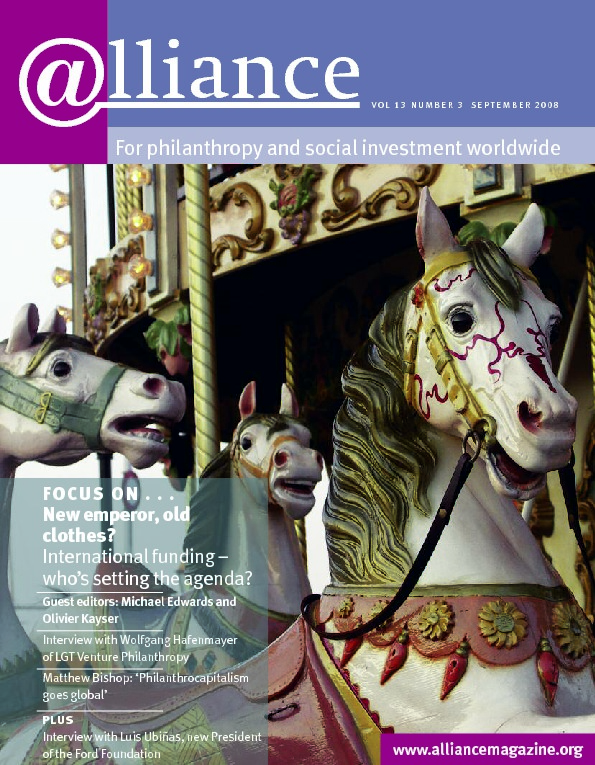As Mr Gunderson notes in his comments on my ‘Watchdog or lapdog?’ article in the September issue of Alliance, the call for foundation accountability is ‘hardly new’. Nor is the limited progress the foundation sector continues to make on accountability. Both Mr Gunderson and Mr Salole react quite strongly against the notion that either the Council on Foundations in the US or the European Foundation Centre, both ‘membership organizations’, have significant roles to play as watchdogs.
In their minds, trade associations like these ‘act as a champion for philanthropy and foundations’ (Salole) and ‘educate and inform … [and do not] pretend we are the law’ (Gunderson). Mr Gunderson suggests that the regulatory ‘stick’ might ‘risk’ these trade associations ‘being seen as an obstacle that prevents even one from trying to improve’.
I don’t think my article suggests that I have any expectation that the Council or the EFC are likely to function as watchdogs. Both Mr Gunderson and Mr Salole seem to have got stuck at the first paragraph where I mention the silence of the Council on nearly all foundation accountability scandals except for its belated actions on the Getty Trust. My article simply notes that the trade associations have demonstrated quite well that beyond promulgating best practices, trade associations function like trade associations, and their protestations to congressional committees that they’re policing their members don’t really wash. The ‘policing’ is voluntary self-policing. Their standards are sign-on. It would be nonsensical to ask the trade associations to replace government as watchdogs, much less regulators, as legions of inadequately self-policed scandals in the US demonstrate.
Do note, however, that there have been efforts in the past by the Council to explore trade association self-regulation (I know, because I got a call asking for my opinion), notably inquiries into the experience of the National Association of Securities Dealers (since merged with the regulatory piece of the New York Stock Exchange (NYSE) to form the still relatively passive Financial Industry Regulatory Authority (FINRA)).
Despite self-regulatory mechanisms that gave major control to non-industry representatives and staff – something that would have been hard for any trade association to swallow – the NASD’s self-regulation was long criticized as inadequate, particularly against larger members that ended up gaining control over the process.
Experience teaches us over and over that government regulation is essential and self-regulation clearly inadequate, and that society needs external, independent watchdogs that push and prod trade associations and government regulators alike, and flag the issues that they should be paying attention to. Without this, both devolve into a symbiotic merging of interests that characterizes, for example, the relationship of the somnolent US Securities and Exchange Commission (SEC) with Wall Street, and we will see repeats of Getty, Madoff (with his own nest of foundations and charities) and more.
If the first paragraph of my article suggests that I think trade associations might function as watchdogs, that is not what I meant to imply. Messrs Gunderson and Salole can return to their jobs of promoting the growth of their organizations and members without concern that I count on them as self-regulatory watchdogs.
Rick Cohen
National reporter, Nonprofit Quarterly



Comments (0)